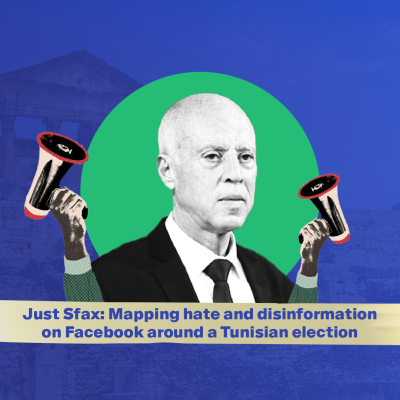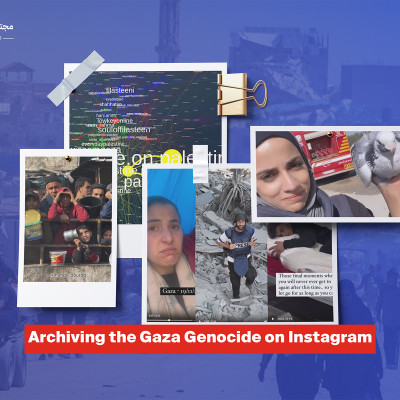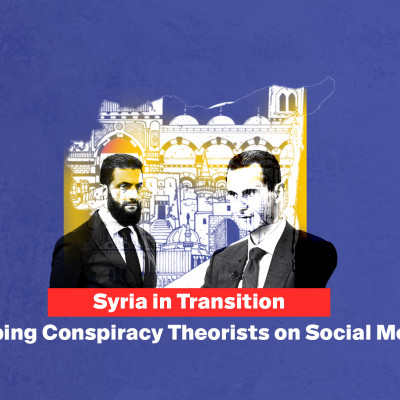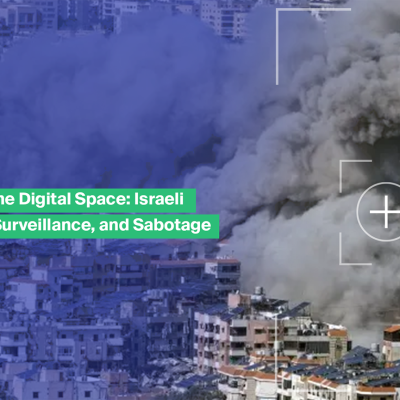Hamid Khalafallah
is a former Nonresident Fellow at TIMEP focusing on inclusive governance and mobilization in Sudan. He is a development practitioner, researcher, and policy analyst.
Beyond the Battlefield: Sudan’s Virtual Propaganda Warzone
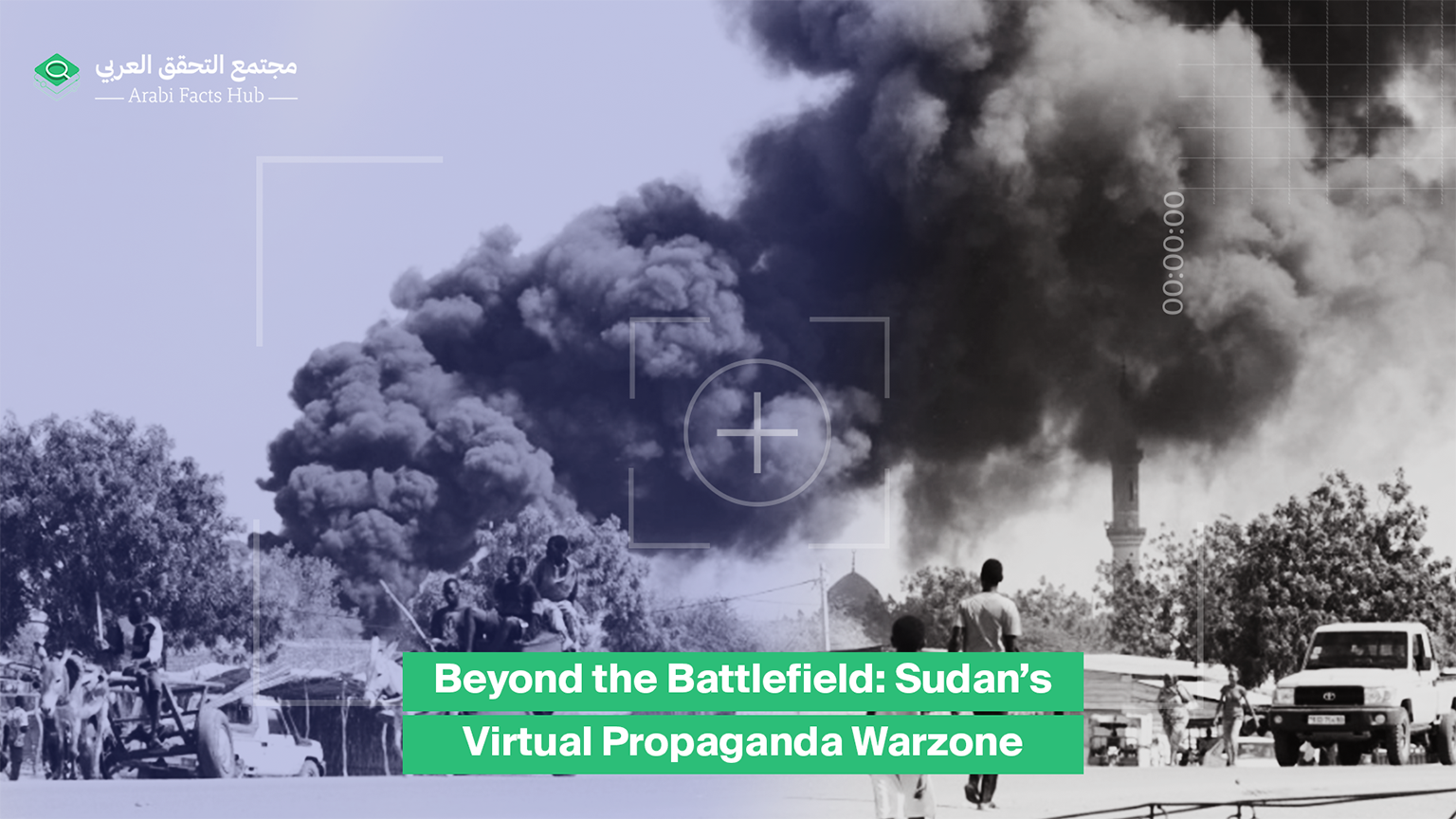
The hopes for a peaceful democratic transition in Sudan were shattered on April 15, 2023, when the country erupted into armed conflict. What began as a power struggle between the Sudanese Armed Forces (SAF) and the paramilitary Rapid Support Forces (RSF) spiraled into a devastating humanitarian crisis, leaving the nation reeling. Moreover, the war has taken a dangerous turn in Darfur, with reports of ethnic cleansing and crimes against humanity by the RSF potentially constituting a genocide as suggested by human rights organizations and recently confirmed by the US genocide determination. The complexity of the war is further exacerbated by the meddling of the Islamists, a group associated with the former authoritarian regime of Omar al-Bashir and his National Congress Party (NCP), who have been publicly calling for the continuation of the war, hoping that they would return to power in the aftermath.
A parallel war is taking place on social media platforms where Sudanese are being bombarded with competing propaganda campaigns by the warring factions to increase support and shape domestic agendas. This fuels the deliberate dissemination of manipulative information, as well as disinformation and divisive hate speech.
Background on digital propaganda and disinformation in Sudan
Disinformation is not new to Sudan and has played a role in deepening divides and undermining trust in government officials and state-controlled media. In particular, the rise of organized online disinformation campaigns in Sudan can be traced to the post-2019 revolution context. Following the overthrow of the regime of the NCP led by Bashir through a nationwide revolution in April 2019, the digital sphere became flooded with dozens of new websites. According to the Freedom House’s Freedom on the Net Sudan report, these websites were established as part of the Cyber Jihad Unit, affiliated with the NCP and focused on monitoring digital spheres and managing online propaganda campaigns against the democratic transition in Sudan.
In October 2021, the leaders of the SAF and RSF jointly orchestrated a military coup, ousting the civilian faction of the transitional government. In the weeks leading to the coup, a systematic campaign was organized on Sudanese social media, flooding it with rumors and disinformation that aimed to mobilize citizens against the transitional government and suggesting that the military should intervene. An analysis conducted by Beam Reports, a Sudanese digital media platform, outlined at least 20 propaganda campaigns circulated on social media in the weeks before the coup that included either fabricated or misleading news. One of the rumors that circulated stated that the head of the United Nations mission in Sudan gave direct orders to the prime minister regarding the formation of the cabinet, suggesting the army should intervene to end this neocolonial approach. This campaign was meant to mislead public opinion and set the ground for the prospective coup. The analysis shows that various actors have engaged in perpetuating these campaigns, including the Islamists, the SAF, and the RSF.
A war of narratives
The SAF and RSF have engaged in a virtual war on social media and traditional media platforms to shape domestic and international opinions to their advantage, polish their images, and whitewash their role in derailing Sudan’s transition to democracy since the first day of the war. They have both remarkably increased the volume of photos, videos, interviews, and statements they publish online. Reports have shown that the RSF and SAF have extended networks engaging their respective campaigns, internally and externally, with accounts based in Russia, the United Arab Emirates, Egypt, and beyond.
Both the RSF and SAF are still attempting to present themselves as guarantors of stability and defenders of democracy and civilian rule. The RSF depict themselves as the guardians of democratic rule in Sudan against the Islamists, using the hashtag #معركة_الديمقراطية, or the “battle for democracy,” to support their communications.
On the other hand, SAF claims to be protecting the unity and sovereignty of the Sudanese state, fighting against the RSF’s mutiny. This narrative is further supported by the Islamists. In line with that, the main hashtag that SAF has been using in its official communication is #معركة_الكرامة, or the “battle for dignity.”
RSF campaigns
The RSF’s propaganda and disinformation campaigns are noticeable across all social media platforms. Their digital advancement predates the current war, as they have been heavily investing in developing their social media presence for years. This is part of a continuous broader public relations campaign that aims to rebrand the RSF and whitewash its involvement in atrocities and human rights violations, particularly in Darfur after the eruption of conflict there in 2003. Reports have documented how the RSF has been hiring international communications and public relations firms, including Dickens & Madson in Canada, Think Doctor in France, and Zero Gravity in the UAE to assist them in polishing their image and spreading disinformation. RSF campaigns have shown clarity and consistency, which has allowed them to build stronger narratives.
The RSF heavily relied on X (formerly Twitter) to spread its agenda, targeting both local and international actors. Before its accounts were suspended, they used to publish almost daily statements and footage claiming occasional victories and attempting to rebrand the paramilitary as a pro-democracy group committed to the slogans of the Sudanese revolution: freedom, peace, and justice. These accounts even used the hashtag #حراس_الثورة_المجيدة, or the “guardians of the glorious revolution.” The RSF had also been consistent in posting content in English, indicating the paramilitary’s strategy of trying to appeal to Western audiences and the international community in general.
X eventually suspended the accounts of the RSF and its leaders in October 2024. Facebook also removed RSF accounts in August 2023. In addition to their official accounts, the RSF have been accused of hijacking at least 900 dormant X accounts to perpetuate its propaganda and disinformation campaigns. A report by Beam Reports in June 2024 has shown Israeli and Emirati user accounts on X taking part in the RSF’s disinformation campaigns.
SAF campaigns
SAF’s utilization of social media platforms for disinformation is rather limited and less advanced than the RSF’s. It mainly uses X to share military victories and counter RSF claims. The SAF has also been accused of using bots and trolls to boost its own disinformation campaign. Valent Projects, a UK-based digital agency that addresses online manipulation, disinformation, and misinformation, examined 12,545 tweets using a pro-SAF hashtag and found out that the top 5 percent of the accounts had classic indicators of bot/troll activity, including generic account names, mass posting, and account registration around the time of the 2019 revolution. The agency also suggested that only 10 percent of the examined tweets seemed to be by authentic accounts. The same report by Valent Projects also suggested that the pro-SAF tweets showed large-scale manipulation promoting escalation with the intention of gaslighting Sudanese and international observers into thinking there is wide support for the SAF to escalate, while authentic Sudanese voices called for an end to the violence.
Nevertheless, SAF mainly relies on traditional media, including the National Broadcasting Corporation (radio and television), which it fully controls. SAF also has a great influence on the privately-owned Sudan News Agency (SUNA), which has been publishing pro-SAF narratives. Nevertheless, in comparison with the RSF, SAF’s messaging has been rather contradictory and confusing, which makes it less effective in shaping public opinion.
Islamists' campaigns
The Islamists, who also mobilized militias to fight along the SAF, have increased their propaganda since the beginning of the war. A report by the Sudan Conflict Monitor suggests that Islamists-affiliated accounts are using a coordinated social media script to incite hatred and sow divisions. They have been organizing campaigns against political leaders and civilian groups, accusing them of colluding with the RSF in attacking the SAF and attempting to take power. They have also labeled all actors taking a neutral stance and calling for the end of the war as “traitors” who are “conspiring” with foreign countries and considered their peace initiatives as acts of treason. Their propaganda and disinformation campaigns have been advocating for SAF to recruit jihadists, as well as mobilizing citizens to pick up arms and fight with SAF. Their messaging has also consistently pushed against SAF partaking in peace talks with the RSF. While the Islamists’ propaganda campaigns are in support of SAF and against the RSF, they mostly focus on attacking civilian political actors. A recent example of this is the campaign against the visit of leaders of the Civilian Sudanese Coordination of Civil Democratic Forces (known as Taqadum) to London in October 2024, labeling them as pro-RSF. The campaign resulted in a large protest in London that attacked the civilian leaders and advocated support for SAF military action. The day of the protest also saw an unprecedented online campaign against civilian actors, specifically Taqadum, as the graph below illustrates.
The growing anti-civilian leaders’ propaganda is exceptionally dangerous as it eliminates the space for civil politics in Sudan. The implications of these campaigns go beyond Taqadum. A popular anonymous pro-SAF account on Facebook, called al-Insirafi, continues to propagate war propaganda and anti-civilian messages. The account recently suggested that the main battle is with some civilian actors rather than the RSF, while another pro-SAF account posted on Facebook that Sudanese de facto authorities should vet the social media accounts of Sudanese citizens and deny issuing them passports if they have not been supporting SAF. Additionally, a popular pro-SAF singer suggested that the Resistance Committees, Sudan’s prominent pro-democracy grassroots movement, should be eliminated.
The anti-civilian actors campaigns are essentially a call for the continuation of the war, with the intention of obstructing efforts by civilian groups to broker peace.
Implications of the war propaganda and disinformation campaigns
The most immediate danger of these digital campaigns is putting millions of vulnerable lives in Sudan at risk. During times of conflict or displacement, those seeking to flee areas affected by the conflict tend to turn to social media for up-to-date guidance and resources; only to find fake accounts that exploit their panic and mislead them. When trying to access necessities like food, water, and medication, Sudanese citizens caught in the crossfire have often relied on information from official sources on social media as a lifeline. The disinformation campaigns have compromised these resources. Various citizens have reported that they planned their movements in conflict-affected areas according to information online, only to find that it was part of the disinformation campaign, which endangered their lives.
The continuation of the virtual war on social media threatens to hinder efforts to find a peaceful resolution. For instance, a report by Arabi Facts Hub in July 2023 analyzed the trending hashtag, #الهدنة_خيانة_عظمى, or “a truce is an act of treason,” that was propagated by pro-SAF accounts on X and Facebook, creating a public opinion against a potential ceasefire agreement between the SAF and RSF. This is also in line with how the pro-SAF or pro-RSF online content spikes around peace initiatives. These deliberate campaigns are used to fuel the mass arming of civilians, as reports show that many have been misled and manipulated to pick up arms and join the fighting. These campaigns continue to perpetuate divisive narratives online, which have polarized Sudanese citizens and exacerbated intercommunal tensions, threatening to damage the Sudanese social fabric beyond repair.
The war has already impeded the civic space in Sudan, and such propaganda exacerbates the situation by limiting the online space for civilians to engage in political dialogues. These campaigns also continue to divide and polarize Sudanese society. In the long run, the anti-civilian actors’ propaganda campaigns are laying the foundations for a fully authoritarian military rule after the war ends, where civilians have no space in politics. To that end, countering these campaigns is crucial and must be an integral part of initiatives aiming to end the war in Sudan, as tackling the virtual propaganda war is key to paving the path to peace.
